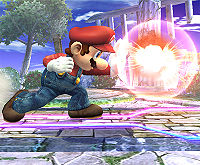Smash attack

A smash attack is a ground attack performed by "tapping" the control stick and pressing the attack button at the same time. It can also be done by tapping the C-stick in the multi-player modes of Melee, or any mode in Brawl. The three types of smashes are the forward smash, up smash and down smash. Despite the name, smash attacks are not related to final smashes.
Smash attacks generally have very high knockback compared to other attacks in a character's arsenal; however, they tend to be very laggy (with a few notable exceptions). In every game since Melee, they can be charged by holding the A button down, giving them more damage and knockback. Uncharged, smash attacks typically do around 14% to 20% varying on the character used and where on the hitbox the attack connects. A smash attack may be charged for up to 60 frames, or 1 second. A fully-charged smash attack does 1.3671× damage in Melee and 1.4× damage in Brawl and Smash 4. For example a smash attack that normally does 16% damage will do 21.8736% damage when fully charged in Melee, while it will do 22.4% fully charged in Brawl and Smash 4. A character receives 20% additional knockback when hit while charging a smash attack.
In Melee's Versus mode, smashes can also be performed by pressing the C-stick in any direction (in single-player mode the C-stick controls the camera). Holding the Z button or A button while pressing the C-stick results in charging the smash. Some forward smashes can be angled in the same way forward tilts can - depending on the angle and the attack, a different amount of damage may be dealt. Usually, smash attacks deal extra damage when angled up and less when angled down (usually a 1% or 2% difference), which the trade-off being the difficulty in hitting shorter targets when angled up. Angled smash attacks can have other properties as well, such as Luigi's forward smash gaining extra IASA frames when angled up.
In Super Smash Bros. Brawl, one can play the game with 4 different controller setups. While the Wii Remote, the Wii Remote and the Nunchuk, GameCube Controller, and the Classic Controller all have control sticks to perform Smash attacks the standard way, when using the Wii Controller on its side, one can also press the direction they are attacking and press both the 1 and 2 buttons at the same time. However, though it is stated in the photo, the 1 button is not required to perform a smash attack. When attacks are charged in Brawl, characters now move while flashing as opposed to just freezing then unleashing the attack. Like in Melee, a small sound can be heard when charging a smash attack. For most characters, it's the same cracking sound from Melee except much less dull, but Yoshi, Diddy Kong, Kirby, Pikachu, Ness, the Ice Climbers, Jigglypuff, Lucas, Olimar, Squirtle, and Wario-Man all make a squeaking noise instead. These characters are all cartoonish in appearance and all of them are lightweight (except for Yoshi and Wario-Man), but it is unknown exactly why these characters were given a special charge sound effect. Mr. Game & Watch adds echoing sound effects to his cracking sound when charging, and is the only character to compliment that sound effect.
In Super Smash Bros. 4, the squeaking charge sound effect has been replaced by short drum beat with a few exceptions: A twittering sound shared by Yoshi, Diddy Kong, Kirby, Pikachu, Jigglypuff, Ness, and Olimar. A swish sound shared by Peach, Rosalina, Zelda, Zero Suit Samus, and Palutena. A sword slash sound shared by Link, Marth, Ike, Robin, Lucina, and Mii Swordfighter. Wii Fit Trainer uses the sound of a whistle for all smash attacks. Mr. Game & Watch makes no extra sound when charging smash attacks. Bowser Jr. uses the drum beat for his up smash but a different sound for his side and down smash attacks. Mega Man uses a charging sound for his side smash, but the drum beat for his up and down smash attacks. Battering item smash attacks can sometimes change character sound effects. For example, Peach changes to the drum beat, but Wii Fit Trainer changes to the swish, and Villager changes to the twittering.
Smash attacks are often powerful finishing moves or simply reaching attacks, but they usually come out slower than neutral A or tilted A attacks, and have longer lag, though their cooldown is generally good, and have good interruptibility (an exception to this being Palutena, whose smash attacks have among the highest cooldown, and no interruptibility). A character who overuses smash attacks is easy to counter. As with any attack, the smash attack's power will also be affected with stale-move negation when it is overused.
Battering items such as the Fan, Lip's Stick, or the Beam Sword have their own forward smash, and can also be charged (except for the Home-Run Bat). Using a smash attack to throw an item often deals more damage than simply tilt-throwing it.
| Attacks in the Super Smash Bros. series | |
|---|---|
| Standard ground attacks | Neutral attack · Dash attack |
| Tilt attacks | Forward tilt · Up tilt · Down tilt · Crouching attack |
| Smash attacks | Forward smash · Up smash · Down smash |
| Aerial attacks | Neutral aerial · Forward aerial · Back aerial · Up aerial · Down aerial · Grab aerial · Glide attack |
| Throws | Grab · Pummel · Forward throw · Back throw · Up throw · Down throw |
| Get-up attacks | Floor attack · Edge attack |
| Special moves | Neutral special move · Side special move · Up special move · Down special move · Command-input move · Final Smash |

